#WhatsApp API with CRM integration
Explore tagged Tumblr posts
Text
WhatsApp Business API Solution
Use WhatsApp to reach and connect with your customers where they are already present. Get WhatsApp Business API solution from go2market to automate your business communication and customer engagement process.

#go2market#WhatsApp API for ecommerce#WhatsApp for customer support#WhatsApp notification service#WhatsApp marketing automation#WhatsApp order tracking API#WhatsApp payment notifications#WhatsApp appointment reminders#WhatsApp API with CRM integration#WhatsApp chatbot for business#Get WhatsApp Business API access#WhatsApp Business API Provider
0 notes
Text
How to Run a WhatsApp Campaign Using an Automated Platform

WhatsApp is one of the most powerful messaging platforms in the world today, with over 2 billion active users globally. It's a great tool for connecting with customers, building relationships, and driving conversions. Whether you're running a small business or managing a large brand, WhatsApp campaigns can play a crucial role in your marketing strategy.
To make your WhatsApp marketing more efficient, you should consider using an automated platform that can handle everything from sending bulk messages to tracking analytics. In this blog, we'll walk you through the steps to running a successful WhatsApp campaign using an automation platform.
Step 1: Choose the Right WhatsApp Automation Platform
The first step to running a WhatsApp campaign is selecting an automation platform that suits your needs. There are several WhatsApp business API platforms available, such as:
Twilio: Offers a flexible API for sending messages globally.
360dialog: Provides an easy-to-use interface for creating WhatsApp campaigns with the ability to integrate with CRMs.
Anlook: Ideal for small businesses, Unlock helps you create campaigns, manage customer conversations, order management and automate responses.
WATI: Ideal for small businesses, WATI helps you create campaigns, manage customer conversations, and automate responses.
MessageBird: Offers omnichannel solutions, including WhatsApp, for seamless communication.
When choosing a platform, consider the following:
Ease of Use: Look for a platform with a user-friendly interface.
Scalability: Ensure it can handle your business’s needs as it grows.
Integrations: Check if the platform integrates well with your CRM, e-commerce site, or other business tools.
Pricing: Make sure the pricing structure fits within your marketing budget.
Step 2: Build Your WhatsApp Contact List
A targeted contact list is key to the success of any marketing campaign. It's important to reach out to people who are genuinely interested in your business.
Opt-in Process: Ensure you're collecting opt-ins from your customers. This can be done via forms on your website, through social media campaigns, or via email marketing.
Segmentation: Segment your audience based on factors such as customer behavior, demographics, purchase history, etc. This will allow you to send tailored messages that resonate with each segment.
Importing Contacts: Once you’ve gathered your contact list, you can import it to your automation platform. Most platforms allow CSV imports, so you can easily transfer contacts from other sources.
Step 3: Define Your Campaign Goals and Strategy
Before you start sending messages, it’s essential to define clear objectives for your WhatsApp campaign. Your goals will guide your messaging and the overall structure of the campaign. Here are a few common campaign goals:
Lead Generation: Collect new leads and nurture them through conversations.
Promotions and Discounts: Inform customers about special offers, seasonal sales, or exclusive discounts.
Customer Support: Use WhatsApp as a customer support channel to resolve queries or provide information.
Product Updates: Keep your audience updated on new product launches, features, or changes to services.
Having a clear goal helps you create compelling content and decide how often to message your audience.
Step 4: Create Engaging and Personalized Content
WhatsApp is a conversational platform, so the key to success is to keep your messages engaging and conversational. Avoid sending generic, spammy content and instead focus on personalization. Here's how:
Personalized Greetings: Start with a friendly greeting that uses the customer’s name to make it feel more personal.
Visual Content: WhatsApp supports multimedia, so you can send images, videos, and GIFs to make your messages more appealing.
Short and Sweet: Keep messages concise but impactful. People check WhatsApp quickly, so a short message with a clear call to action (CTA) works best.
Use Templates: Many platforms allow you to create message templates for repetitive tasks. For example, welcome messages or follow-up reminders. Templates ensure consistency and save time.
Step 5: Automate Message Delivery
Now that you’ve crafted your messages, it’s time to set up your automation. Depending on the platform you're using, you can set up different automation workflows:
Scheduled Messages: You can schedule your messages to be sent at specific times. This is useful for campaigns like holiday offers or limited-time promotions.
Drip Campaigns: A drip campaign sends a series of messages over time, nurturing leads or educating customers. This is an effective strategy for onboarding new clients or providing valuable content.
Triggers and Actions: Automate actions based on specific triggers. For example, when a customer opts in or clicks on a link, the platform can send them a follow-up message or a special offer.
Step 6: Track Performance and Optimize
Once your campaign is live, it's essential to monitor its performance and adjust your strategy based on the results. Most WhatsApp automation platforms offer analytics tools to help you track:
Delivery Rates: How many messages were successfully delivered.
Open Rates: How many recipients opened your message.
Response Rates: How many people replied to your messages.
Conversions: How many leads or sales were generated from the campaign.
Based on this data, optimize your future campaigns by adjusting your messaging, frequency, or targeting.
Step 7: Maintain Compliance
WhatsApp has strict policies to protect users from spam and unwanted messages. Make sure you're in compliance with the following:
Consent: Only message customers who have opted in.
Unsubscribe Option: Always provide a way for users to opt out of receiving messages.
Data Privacy: Follow local data privacy laws, such as GDPR, and ensure you're handling customer data responsibly.
Final Thoughts
Running a WhatsApp campaign through an automation platform can be a game-changer for your business. It allows you to connect with customers on a more personal level, scale your messaging efforts, and track your results to continually improve your strategy. By choosing the right platform, segmenting your audience, and creating engaging content, you'll be able to run successful WhatsApp campaigns that drive results.
Ready to launch your WhatsApp marketing campaign? Choose an automation platform, get started with these steps, and watch your business grow!
#WhatsApp Business API#WhatsApp Marketing Automation#WhatsApp Campaign Tools#WhatsApp Marketing Strategy 2025#WhatsApp Broadcast List#WhatsApp CRM Integration#WhatsApp Chatbots for Business#WhatsApp Bulk Messaging#WhatsApp Customer Engagement#WhatsApp Business Features 2025#WhatsApp Campaign Best
0 notes
Text
0 notes
Text
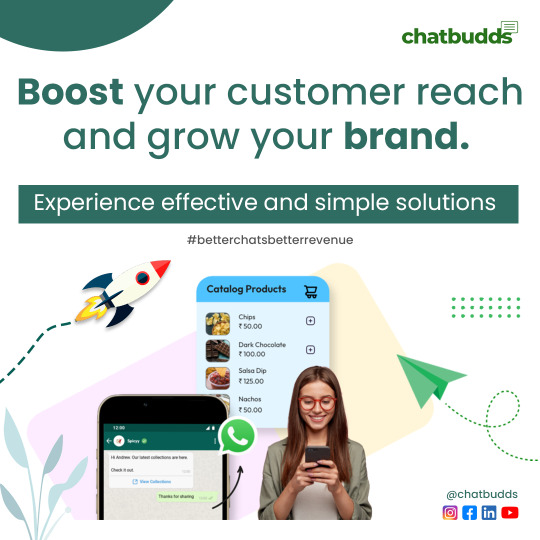
Websites with live chats enhance customer support by providing real-time assistance, improving user experience and satisfaction.
#whatsapp marketing tools#whatsapp marketing#whatsapp marketing software#whatsapp crm#whatsapp for business#whatsapp business marketing#whatsapp business tools#whatsapp chatbot pricing#whatsapp platform for business#whatsapp integration for business#whatsapp business api#whatsapp api pricing#whatsapp marketing api#websites with live chats#bot live chat
0 notes
Text
The Ultimate Guide to CRM API Integration: Enhance Your Customer Service Today
Customer Relationship Management (CRM) systems have revolutionized the way businesses interact with their customers. In today’s digital age, CRM API integration plays a pivotal role in streamlining processes, improving customer service, and driving business growth. This comprehensive guide will delve into the intricacies of CRM API integration, its benefits, and how to effectively implement it in your organization.
In today’s data-driven business landscape, customer relationship management (CRM) systems, such as WhatsApp CRM, and comprehensive customer service software play an increasingly central role in building strong client relationships and fostering loyalty. These tools are essential for managing customer interactions, tracking sales, and providing top-notch customer support. However, what if you could unlock even greater efficiency, insights, and capabilities by connecting these platforms with other valuable applications across your business? This is where APIs (Application Programming Interfaces) come into play.
APIs act as digital bridges, enabling seamless data exchange between different software programs and creating a more unified and powerful ecosystem. By integrating your CRM and customer service software with other essential business applications, you can enhance data accuracy, streamline operations, and gain comprehensive insights into your customer base. This integration allows for real-time data synchronization, ensuring that all your systems are up-to-date and consistent, which is crucial for making informed business decisions and delivering exceptional customer experiences.
What is CRM API Integration?
Before diving into the benefits and implementation strategies, it is essential to understand what CRM API integration is. API stands for Application Programming Interface, a set of rules and protocols that allows different software applications to communicate with each other. CRM API integration refers to the process of connecting your CRM system with other software applications through APIs, enabling seamless data exchange and functionality enhancement.
Why is CRM API Integration Important?
CRM API integration is crucial for several reasons:
Enhanced Data Accuracy: Integrating your CRM with other systems ensures that data is consistently updated across platforms, reducing errors and duplications.
Improved Customer Insights: By integrating various data sources, businesses can gain a holistic view of their customers, leading to more informed decision-making.
Increased Efficiency: Automation of data entry and other repetitive tasks frees up time for employees to focus on more strategic activities.
Scalability: As your business grows, CRM API integration allows for the addition of new functionalities and systems without disrupting existing processes.
Key Benefits of CRM API Integration
Integrating your CRM with other applications offers a multitude of benefits:
1. Streamlined Operations
One of the primary advantages of CRM API integration is the streamlining of business operations. By connecting your CRM with other essential tools, such as email marketing platforms, social media management tools, and customer support systems, you can automate workflows and ensure that information flows seamlessly between systems.
2. Enhanced Customer Service
With CRM API integration, your customer service team has access to comprehensive customer data in real-time. This enables them to provide personalized support, resolve issues faster, and anticipate customer needs, ultimately leading to higher customer satisfaction and loyalty.
3. Better Marketing Campaigns
Integrating your CRM with marketing automation tools allows for more targeted and effective marketing campaigns. By leveraging customer data stored in your CRM, you can segment your audience, tailor your messaging, and track campaign performance, leading to higher engagement and conversion rates.
4. Improved Sales Performance
CRM API integration empowers your sales team with valuable insights and tools to close deals more efficiently. By integrating your CRM with sales automation tools, you can streamline lead management, track sales activities, and provide your sales team with up-to-date information, enabling them to focus on closing deals rather than administrative tasks.
5. Comprehensive Reporting and Analytics
By integrating your CRM with various data sources, you can generate comprehensive reports and gain deeper insights into your business performance. This enables you to make data-driven decisions, identify trends, and optimize your strategies for better results.
Common Use Cases for CRM API Integration
There are numerous ways businesses can leverage CRM API integration to enhance their operations. Some common use cases include:
1. Integrating CRM with Email Marketing Platforms
Connecting your CRM with email marketing platforms allows for the automation of email campaigns, synchronization of contact lists, and tracking of email engagement metrics. This integration ensures that your marketing efforts are aligned with your customer data, leading to more personalized and effective email campaigns.
2. Integrating CRM with Social Media Management Tools
By integrating your CRM with social media management tools, you can track social media interactions, monitor brand mentions, and engage with customers directly from your CRM. This integration helps you maintain a consistent brand presence and provides valuable insights into customer sentiment and preferences.
3. Integrating CRM with E-commerce Platforms
For businesses in the e-commerce sector, integrating your CRM with your e-commerce platform enables you to track customer purchase history, manage inventory, and personalize the shopping experience. This integration ensures that your CRM contains up-to-date information about your customers’ buying behaviors, allowing for more targeted marketing and sales efforts.
4. Integrating CRM with Customer Support Systems
Integrating your CRM with customer support systems allows for the seamless management of customer inquiries, support tickets, and feedback. This integration ensures that your support team has access to complete customer profiles, enabling them to provide faster and more personalized support.
5. Integrating CRM with Accounting Software
By integrating your CRM with accounting software, you can automate invoicing, track payments, and manage financial data more efficiently. This integration ensures that your financial records are accurate and up-to-date, reducing the risk of errors and improving financial reporting.
Conclusion
CRM API integration is a powerful tool that can significantly enhance your customer service, streamline operations, and drive business growth. By understanding its importance, benefits, and implementation strategies, you can effectively integrate your CRM with other systems and maximize its potential. Follow best practices, address common challenges, and continuously monitor and optimize your integration to ensure long-term success. Embrace CRM API integration today and take your customer service to the next level.
Want to Integrate an API with Your CRM or Customer Service Software ? Consult Go4whatsup Now
#CRM API integration#whatsapp business api#whatsapp api#whatsapp marketing#marketing automation tools#whatsapp api provider#whatsapp marketing guide
0 notes
Text
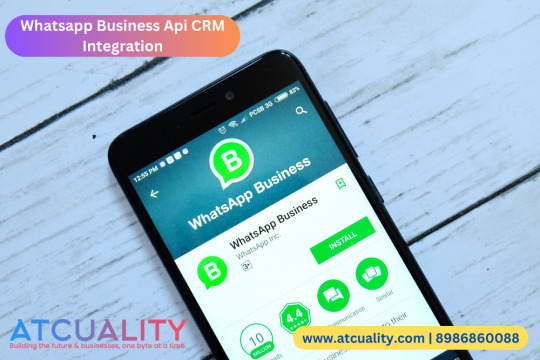
#whatsapp business api crm integration#whatsapp business api integration with crm#whatsapp business crm integration#whatsapp business integration#whatsapp business integrations#whatsapp busniess api#whatsapp for business integration with crm
0 notes
Text
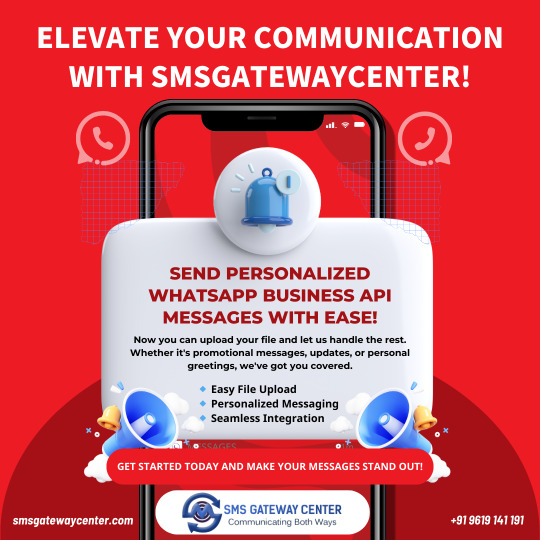
Unleash the Power of Personalized Messaging with SMSGatewayCenter’s WhatsApp Business API File Upload Feature
Personalization is essential for attracting and keeping customers in the always changing world of digital communication. Companies are always looking for creative methods to modify their messaging to fit the specific requirements and preferences of their target audience. With its cutting-edge WhatsApp Business API capability, SMSGatewayCenter is leading the way in the personalization revolution by enabling users to easily upload files and send customized messages.
#WhatsApp Business API#personalized messaging#file upload feature#SMSGatewayCenter#customer engagement#communication strategy#automated messaging#CRM integration#scalable solutions#customer satisfaction
1 note
·
View note
Text
Reply.io is a sales engagement platform designed to help sales teams automate and manage their outreach efforts through multiple communication channels. It aims to streamline the process of engaging with prospects and customers, thereby increasing productivity and efficiency.
Below is a detailed review of its features and functionalities:
Key Features
Multi-Channel Outreach:
Email Campaigns: Automate and personalize email sequences to reach prospects effectively.
Phone Calls: Integrates with VoIP services to facilitate direct calling from the platform, including features like call recording and logging.
Social Media: Allows outreach via LinkedIn, including automated message sequences.
SMS and WhatsApp: Supports text-based outreach through SMS and WhatsApp for more direct communication channels.
Automation and Sequencing:
Automated Workflows: Create automated workflows that sequence multiple touch points across different channels.
Conditional Logic: Use conditional steps to branch sequences based on recipient behavior, such as email opens or replies.
Task Automation: Automate repetitive tasks such as follow-ups, reminders, and updating CRM records. Personalization and AI:
Email Personalization: Use dynamic fields to personalize email content, increasing engagement rates.
AI-Powered Suggestions: AI tools provide suggestions for improving email content and outreach strategies.
Personalized Videos: Integrates with video messaging tools to include personalized video content in emails.
Integration and API:
CRM Integration: Seamlessly integrates with major CRM systems like Salesforce, HubSpot, and Pipedrive, ensuring data synchronization.
API Access: Provides API access for custom integrations and automations, allowing for greater flexibility.
Third-Party Tools: Connects with various other tools such as Zapier, Slack, and Google Apps to enhance functionality.
Analytics and Reporting:
Campaign Analytics: Detailed analytics on email open rates, reply rates, click-through rates, and more.
A/B Testing: Test different versions of emails to determine which performs better.
Team Performance: Track team performance metrics to identify areas for improvement and optimize outreach efforts.
Contact Management:
Lead Management: Centralized database for managing contacts and leads, with segmentation and filtering options.
Enrichment: Automatic data enrichment to enhance lead profiles with relevant information.
Prospect Importing: Easily import contacts from CSV files or directly from integrated CRM systems.
Pros Comprehensive Multi-Channel Outreach: Supports a variety of communication channels, providing a holistic approach to sales engagement.
Advanced Automation and Sequencing: Powerful automation features help streamline workflows and increase efficiency.
Deep Personalization: Tools for email and video personalization improve engagement and response rates.
Robust Integration Capabilities: Seamless integration with CRM systems and other third-party tools enhances data synchronization and workflow automation.
Detailed Analytics: Comprehensive reporting and analytics provide insights into campaign performance and team productivity.
Cons Complexity: The extensive features and customization options can be overwhelming for new users, requiring a learning curve to fully utilize the platform.
Cost: Pricing can be relatively high, especially for smaller businesses or startups with limited budgets.
Limited Free Tier: The free tier offers limited functionality, which may not be sufficient for more extensive outreach needs.
Reply.io is a powerful and versatile sales engagement platform that offers a comprehensive suite of tools for multi-channel outreach, automation, and personalization. Its robust integration capabilities and detailed analytics make it an excellent choice for sales teams looking to optimize their engagement strategies and improve productivity. However, the complexity and cost may pose challenges for smaller organizations or those new to such platforms. Overall, Reply.io provides significant value for businesses seeking to enhance their sales outreach and engagement efforts.
4 notes
·
View notes
Text
Leading IT Company in the UK for Digital Marketing, Software, App & E-Commerce Solutions
In today’s digital-first business landscape, companies need more than just a basic online presence. They need intelligent technology solutions, growth-oriented digital marketing, and user-friendly mobile applications. That’s where Equiconsulting Services Pvt Ltd, a leading IT company operating in the UK, steps in.
With a focus on innovation, performance, and business transformation, we provide a wide range of IT services under one roof—from digital marketing to software development, e-commerce website design, and mobile app development.
🌐 Our Core Services
1. Digital Marketing Services in the UK
Attract, engage, and convert your audience with data-driven strategies:
Search Engine Optimization (SEO)
Google Ads & Pay-Per-Click (PPC)
Social Media Marketing (Facebook, Instagram, LinkedIn)
Email and WhatsApp Campaigns
Content Creation & Blog Strategy
We don’t just market, we build digital brand experiences.
2. Custom Software Development
Whether it’s a CRM, ERP, HRMS, or bespoke business application, our team builds secure, scalable software tailored to your exact requirements. From planning to deployment, we manage everything.
3. E-Commerce Website Design & Development
Ready to sell online? We design responsive, fast, and secure e-commerce websites that convert visitors into customers. Our e-commerce platforms include:
Product catalog & search features
Payment gateway integration
Admin panel & order management
Inventory and logistics modules
4. Mobile App Development (Android & iOS)
In a mobile-first world, apps are essential. Our team builds feature-rich, user-friendly apps:
Native & hybrid mobile apps
UI/UX optimized for engagement
Secure backend & API integration
E-commerce, service-based, or custom apps
💡 Why Choose Equiconsulting Services Pvt Ltd?
✅ Full-stack IT service provider in the UK
🚀 Business-driven results, not just services
💼 Transparent pricing and dedicated project managers
📈 Scalable solutions for startups, SMEs & enterprises
💬 One-on-one consultation & post-project support
We’re not just developers—we’re your IT growth partners.
🌍 Serving Businesses Across the UK
No matter where your business is located in the UK—London, Manchester, Birmingham, or Glasgow—we deliver world-class IT and marketing services remotely and efficiently, keeping timelines tight and communication clear.
📣 Final Words
From building high-performing websites to running impactful marketing campaigns and developing cutting-edge software and apps, Equiconsulting Services Pvt Ltd is your go-to IT company in the UK.
We combine creativity, strategy, and technology to help you thrive in a competitive digital world.
🔗 Contact Us Today!
0 notes
Text
How to Increase WhatsApp Message Limit in 2025 – Complete Guide
WhatsApp remains one of the most powerful tools for customer communication in 2025. But if your business relies on bulk messaging, you’ve likely hit a wall with WhatsApp’s daily message sending limits. Whether you’re using the official WhatsApp Business API or working with a BSP like The Botmode, understanding and increasing your messaging limits is key to scaling effectively.
In this guide, you’ll learn:
How WhatsApp’s messaging tiers work
How to increase your message sending limit
Tips for maintaining high-quality message ratings
Common mistakes that can hurt your account health
What Are WhatsApp Messaging Tiers?
WhatsApp Business API accounts are grouped into tiers based on how many unique users they can message in a 24-hour period:TierLimit per 24 Hours11,000 unique users210,000 unique users3100,000 unique users4Unlimited (based on conditions)

How to Set Up WhatsApp Business API (2025)
If you’re new to WhatsApp Business API, here’s how to get started:
1. Verify Your Business
Create a Facebook Business Manager account
Submit required documents and company information
Wait for Meta to verify your account
2. Choose a BSP (Business Solution Provider)
To simplify integration, consider a BSP like The Botmode, which provides a UI, automation, and Shopify/WooCommerce integrations.
3. Set Up a Dedicated WhatsApp Number
Use a clean number not linked to any personal WhatsApp
This number will be tied to your WhatsApp Business account
4. Create and Submit Message Templates
All outbound messages must use pre-approved templates
Templates should be clear, concise, and follow Meta’s content policy
How to Increase WhatsApp Message Sending Limit
To move from Tier 1 to higher tiers, you must show consistent volume and high-quality engagement. Here’s how:
Send Consistent Message Volume
To move from Tier 1 to Tier 2, message at least 2,000 users over 7 days
Each successful message counts toward tier progression
Maintain a High-Quality Score
Avoid spammy behavior
Keep opt-out and complaint rates low
Monitor template performance regularly
Encourage Opt-Ins and Reduce Blocks
Only message users who have given clear consent
Make it easy for users to opt out
Verify and Strengthen Your Brand
A verified Facebook Business profile builds trust
Verified status also helps with higher messaging tiers
Best Practices to Maintain a High-Quality Rating
To keep your quality score in the green zone, follow these guidelines:
Do This:
Personalize messages based on customer behavior
Send messages only to opted-in users
Include context in the first message (don’t just say “Hi”)
Provide opt-out instructions in every conversation
Use a respectful and professional tone
Update your business information and contact details
Avoid asking for sensitive personal or financial data
Avoid This:
Messaging users who never opted in
Over-messaging or sending too frequently
Vague or generic messages with no clear value
Mishandling or sharing user data
Using aggressive or misleading content
Getting blocked or reported by too many users
https://thebotmode.com/wp-content/uploads/2025/05/ChatGPT-Image-May-27-2025-04_21_39-PM-1.jpg
How WhatsApp Determines Message Quality
Meta evaluates your message quality based on:
User feedback (blocks, reports, opt-outs)
Template performance metrics
Engagement and response patterns in the last 7 days
You can monitor your message quality in: Meta Business Manager → WhatsApp Manager → Phone Numbers
Why Choose The Botmode for WhatsApp Automation?
The Botmode helps D2C brands automate WhatsApp campaigns while maintaining compliance and maximizing ROI.
With The Botmode, you can:
Automate personalized campaigns at scale
Monitor delivery, read rates, and conversions
Manage message templates and schedule smartly
Maintain a high-quality score using built-in best practices
Integrate with platforms like Shopify, WooCommerce, CRMs, and more
Visit: thebotmode.com/whatsapp-automation
Final Thoughts
Scaling your WhatsApp messaging in 2025 is about consistency, compliance, and customer experience. Once your API is properly set up and your campaigns follow Meta’s best practices, you’ll naturally progress through higher messaging tiers. Tools like The Botmode make this journey faster, safer, and smarter.
FAQs
Q1: How often can my messaging tier be upgraded?Meta reviews accounts continuously. Upgrades can happen within 24 to 72 hours once your volume and quality meet the criteria.
Q2: What’s the most common reason for tier downgrade?A high number of user blocks or reports can reduce your message quality score and result in a lower tier.
Q3: Can I message users who haven’t opted in?No. WhatsApp requires clear opt-in consent before you can start a conversation.
know more> https://thebotmode.com/increase-whatsapp-message-limit/
0 notes
Text
How Chatbots & Conversational Marketing Are Driving 24/7 Conversions | Best Digital Marketing Company in Prayagraj Insights
In today’s fast-paced digital world, people want answers now. Whether it’s midnight or a national holiday, modern customers expect instant support, instant replies, and instant action. That’s exactly why chatbots and conversational marketing have become essential for businesses in 2025.
At the Best Digital Marketing Company In Prayagraj, we help brands use smart, AI-powered chat tools to convert conversations into sales, leads, and customer loyalty—24 hours a day.
Let’s explore how.
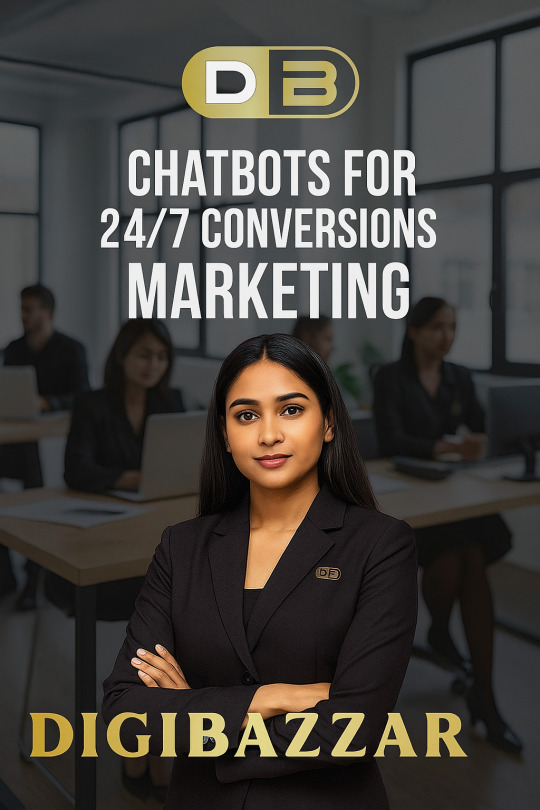
What Are Chatbots & Conversational Marketing?
Chatbots are automated software tools (often AI-powered) that can simulate human conversations through chat interfaces like websites, WhatsApp, Instagram, or Facebook.
Conversational Marketing is a strategy where brands engage customers in real-time, two-way conversations to build relationships and drive actions—like booking a demo, making a purchase, or signing up.
Together, they form a powerful duo that enables businesses to:
Respond instantly
Qualify leads
Book appointments
Make sales — even while you sleep!
Why Are They So Powerful in 2025?
Always-On = Always Earning Your chatbot never takes a break. It works on Sundays, at midnight, and during lunch hours—converting curious visitors into customers.
Fast Response = Higher Conversions According to data, 74% of users convert when brands respond within 5 minutes. Chatbots do that instantly.
Zero Wait Time = Better Experience Users don’t like filling out long forms or waiting for email replies. A chatbot gives them answers now, and people buy from businesses that respect their time.
What Chatbots Can Do for You (Beyond Hello)
With conversational flows designed by experts like us at the Best Digital Marketing Agency in Prayagraj, chatbots can:
Greet visitors personally
Ask qualifying questions
Recommend products/services
Handle FAQs
Share offers & coupons
Book appointments
Collect feedback
Send real-time WhatsApp or email alerts to your sales team
Real Case Study: How One Local Business Got 3X More Leads
A local home decor brand in Prayagraj added a WhatsApp chatbot to their website, managed by our Social Media Marketing Service In Prayagraj.
Within 30 days:
3X increase in qualified leads
52% more conversions from Instagram ads
80% customer satisfaction rate on first-response
The chatbot answered product questions, took orders, and sent alerts to the team—all without human involvement.
Combine with Smart Platforms
Some tools we use:
Meta Business Suite + WhatsApp Cloud API
Tidio / ManyChat
ChatGPT-based assistants
Zoho SalesIQ & CRM
Drift + HubSpot integration
This creates a full conversion ecosystem, with chatbots syncing directly into your email system or CRM.
Chatbots by The Best Digital Marketing Company in Prayagraj
We don’t just install bots—we build a chat strategy:
Personalized welcome flows
Product recommendation logic
Language-localized options (English/Hindi)
WhatsApp + Instagram + website integration
Lead tracking & analytics dashboard
Final Thoughts: Conversations = Conversions in 2025
If your business still waits for manual inquiries and delayed emails—you’re losing leads by the minute.
Chatbots and conversational marketing are not trends—they're now a non-negotiable part of your funnel.
So, are you ready to let AI handle conversations while you focus on growing?
Let’s Build Your 24/7 Conversion Machine
Partner with the Best Digital Marketing Agency In Prayagraj and let us design chatbot flows that: Greet every visitor Collect leads Close more sales
Contact us now for a FREE chatbot consultation!
#search engine optimization#digital marketing agency#social media marketing#ppc advertising#email marketing
0 notes
Text
What Are the Key Steps in AI Chatbot Development?
In the era of instant digital interaction, AI chatbots have become indispensable tools for businesses seeking to enhance customer experience, streamline operations, and drive engagement. From handling customer queries to automating repetitive tasks, chatbots are revolutionizing how companies communicate. But how exactly is an AI chatbot created? Let’s walk through the key steps in AI chatbot development, from concept to deployment and optimization.

1. Define the Chatbot's Purpose and Goals
Before jumping into development, it's crucial to define what the chatbot is supposed to do. Consider the following questions:
Will it answer customer service queries?
Will it guide users through a purchase journey?
Will it be used for internal tasks like IT support?
Setting a clear purpose allows for focused development and helps determine the required features, platforms, and AI sophistication. This phase also includes identifying the target audience and expected interactions.
2. Choose the Right Chatbot Type
There are mainly two types of chatbots:
Rule-based chatbots: Follow a predefined flow and can handle simple queries.
AI-powered chatbots: Use machine learning (ML) and natural language processing (NLP) to understand context, intent, and user sentiment.
For businesses looking to provide more personalized and adaptive interactions, AI chatbots are the go-to solution.
3. Select Development Tools and Platforms
Once you’ve determined the type, select the appropriate tools and platforms. Popular options include:
Development Frameworks: Microsoft Bot Framework, Google Dialogflow, Rasa, IBM Watson Assistant
Languages: Python, Node.js, Java
Hosting Platforms: AWS, Google Cloud, Azure
You also need to decide where the chatbot will be deployed—web, mobile apps, messaging platforms (like WhatsApp or Facebook Messenger), or all.
4. Design the Conversation Flow
Conversation design is one of the most creative and strategic parts of chatbot development. It includes:
Mapping out various user scenarios
Designing dialog trees for rule-based responses
Creating intents, entities, and responses for AI-based models
Considering fallback responses when the bot doesn’t understand
For AI-powered bots, the design must also factor in context retention and multi-turn conversations.
5. Train the NLP Model
If you're building an AI chatbot, you must train it to understand human language. This includes:
Defining intents (what the user wants)
Setting up entities (important data in user inputs)
Feeding sample utterances for each intent
Training the model with diverse input scenarios
The more varied the training data, the better your chatbot will perform. Using pre-trained language models like GPT or BERT can give you a strong starting point.
6. Integrate with Backend Systems
For the chatbot to be truly useful, it must integrate with databases, CRMs, ERPs, and APIs. For example:
An e-commerce chatbot might connect to inventory and order tracking systems.
A customer service bot may pull user data from a CRM like Salesforce.
An internal HR bot might integrate with employee databases and leave management tools.
This enables real-time, dynamic responses and allows the bot to perform complex tasks.
7. Test Extensively
Before deployment, thorough testing is essential:
Unit Testing: Each component (intent recognition, entity extraction, etc.)
Integration Testing: Interactions with external systems
User Testing: Real users interacting with the bot to check for errors, confusion, and gaps
Testing should focus on usability, accuracy, fallback behavior, and performance under load.
8. Deploy the Chatbot
Once the chatbot passes all tests, it’s ready for deployment. Ensure it’s launched on the desired platforms and integrated with necessary monitoring tools. Set up analytics dashboards to track:
Number of users
Engagement rate
Drop-off points
Intent success rate
Cloud-based services make deployment scalable and manageable.
9. Monitor, Analyze, and Optimize
Post-launch, the real work begins. Continuous improvement is key to chatbot success:
Collect conversation logs and analyze them for improvement areas
Use analytics to track usage trends and performance metrics
Regularly retrain the AI model with new data
Add new intents, flows, or languages based on user feedback
Optimization should be a regular process to keep the chatbot relevant and effective.
10. Ensure Security and Compliance
AI chatbots often handle sensitive data. It’s critical to:
Implement end-to-end encryption
Follow GDPR, HIPAA, or other industry-specific regulations
Use secure APIs and authentication mechanisms
Security measures must be baked in from the design phase, not added later.
Conclusion
AI chatbot development is a multi-stage journey that combines strategic planning, technical expertise, and ongoing refinement. By following these key steps—from goal setting and tool selection to testing and optimization—you can build a chatbot that not only automates tasks but also enhances user experience and delivers business value.
As businesses increasingly embrace automation, AI chatbot development is no longer optional—it’s a competitive necessity. Whether you're a startup or an enterprise, investing in a well-planned chatbot strategy can lead to smarter interactions, happier customers, and a more efficient organization.
0 notes
Text
Enhance Your Customer Support with a WhatsApp Business Solution Provider
Customer communication is everything in a digital-first world. To engage its audience in real-time, a business needs to be a reliable and creative messaging application. This is where a WhatsApp business solution provider is essential. With the sheer number of users on WhatsApp, it is the fastest-growing and preferred channel for businesses to provide real-time customer support and send operational updates.
Why do I need to use a WhatsApp Business API Provider?
If you are focused on growing your brand, using a trusted WhatsApp business API provider is smart because the API allows businesses to automate messages, manage customer conversations, send bulk notifications, and integrate CRM system bots for complete engagement with customers. Using a WhatsApp business API allows businesses to deliver quick, consistent, and safe communication while building trust and increasing sales.
Localized Service from a WhatsApp Business Solution Provider in Chennai
For South Indian businesses that are looking to engage a WhatsApp solution provider in Chennai, there are inherent benefits. These providers have knowledge of the local market needs and will integrate with your business with a personal approach to onboarding, customer support, customization, and integration. Whether your business is small or large, a local WhatsApp solution provider can equip you to meet the demands of your customers through WhatsApp's business tool.
Partnering with a Trusted WhatsApp Business API Provider in Chennai
Working with the right WhatsApp Business API provider in Chennai ensures you receive all the support- from approval, to message templates and analytics. They will help you manage customer interactions more effectively, and subsequently, in less time, while improving customer satisfaction. They will also often have more competitive pricing for businesses based in and around Chennai.
Why Companies in India Are Using a WhatsApp Business API Provider India
With more and more customers in India using WhatsApp rather than making calls or sending emails, selecting the correct WhatsApp business api provider India is important to keep up! Every sector from e-commerce to education is using WhatsApp automation to supply faster responses and to improve customer engagement.
Final Words – Sign Up with Wacto Now.
Choosing the right WhatsApp business solution provider India is a critical step to improve the communication and customer experience with your brand. Wacto has on offer the full range of WhatsApp API solutions for each size business and for all sectors. As Ajm India WhatsApp business API Provider, Wacto have a smooth onboarding process, round-the-clock help support, and rapid deployment of automation tools.
Whether you are looking for a trustworthy WhatsApp business solution provider Chennai or anywhere else in India, Sign up with Wacto now and improve your customer engagements!
#WhatsApp business solution provider Chennai#WhatsApp business API Provider#WhatsApp business solution provider
0 notes
Text
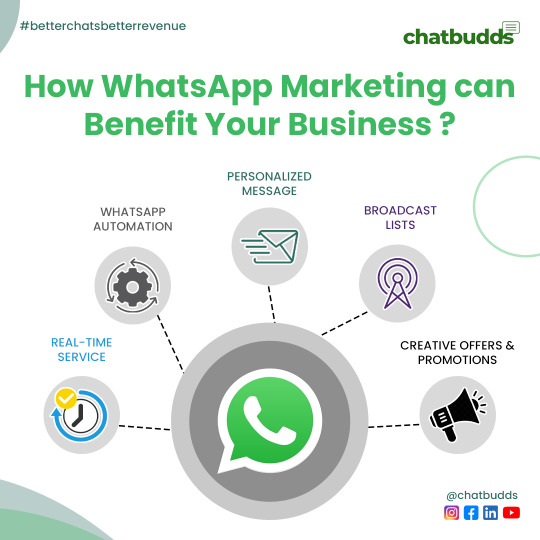
The WhatsApp marketing API enables businesses to automate messaging, track campaign performance, and integrate with existing systems for effective marketing.
#whatsapp marketing tools#whatsapp marketing#whatsapp marketing software#whatsapp crm#whatsapp for business#whatsapp business marketing#whatsapp business tools#whatsapp chatbot pricing#whatsapp platform for business#whatsapp integration for business#whatsapp business api#whatsapp api pricing#whatsapp marketing api#websites with live chats#bot live chat
0 notes
Text
How to Enhance Customer Engagement with WhatsApp Business CRM Integration
In today's digital age, customer engagement plays a crucial role in the success of businesses. With the proliferation of messaging apps and the demand for instant communication, integrating WhatsApp Business with CRM systems has become a game-changer for enhancing customer interactions. This blog explores how businesses can leverage WhatsApp Business CRM integration to improve customer engagement effectively.
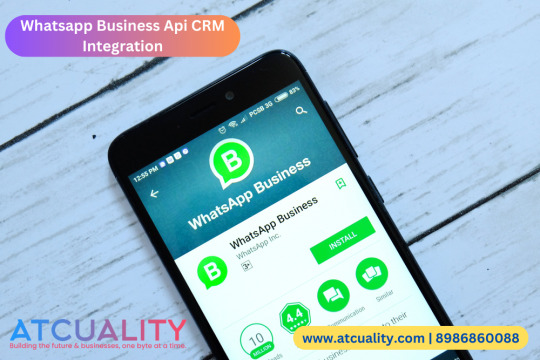
Understanding WhatsApp Business CRM Integration
WhatsApp Business offers a powerful API that allows businesses to streamline communication with customers. When integrated with CRM (Customer Relationship Management) systems, this API enables businesses to manage customer interactions more efficiently, centralize data, and deliver personalized experiences.
Key Benefits of WhatsApp Business CRM Integration
1. Seamless Communication: Integrating WhatsApp Business with CRM systems enables businesses to communicate with customers through a familiar platform. This enhances accessibility and convenience, as customers can reach out via WhatsApp for inquiries, support, or feedback.
2. Personalized Customer Interactions: CRM integration allows businesses to access customer data seamlessly within WhatsApp conversations. This empowers customer service agents to deliver personalized responses based on past interactions, purchase history, preferences, and more.
3. Automation and Efficiency: Automation features offered by CRM systems can be integrated with WhatsApp Business to automate routine tasks such as sending order confirmations, shipping updates, appointment reminders, and proactive customer service messages. This frees up valuable time for customer service teams to focus on more complex queries.
4. Enhanced Customer Support: WhatsApp Business CRM integration enables businesses to provide real-time support, resolving issues promptly and effectively. Customers appreciate the immediacy and responsiveness, leading to higher satisfaction and loyalty.
5. Multi-channel Engagement: Beyond text messages, WhatsApp supports multimedia content such as images, videos, and documents. CRM integration allows businesses to utilize these features to enrich customer interactions, share product demos, tutorials, and promotional offers seamlessly.
Implementing WhatsApp Business CRM Integration
1. Choose the Right CRM Platform: Select a CRM system that offers robust integration capabilities with WhatsApp Business API. Ensure compatibility and scalability to meet your business's current and future needs.
2. API Integration: Work with your CRM provider or a qualified developer to integrate WhatsApp Business API with your CRM system. This involves setting up API endpoints, configuring message templates, and establishing data synchronization protocols.
3. Customize Communication Flows: Tailor communication workflows to align with your business objectives and customer journey. Design automated responses and triggers that enhance engagement without sacrificing personalization.
4. Train Your Team: Provide training to customer service teams on using the integrated platform effectively. Emphasize the importance of maintaining a consistent brand voice and delivering exceptional customer experiences through WhatsApp Business.
5. Monitor and Optimize Performance: Regularly monitor key performance indicators (KPIs) such as response time, customer satisfaction ratings, and conversion rates. Use analytics provided by your CRM system to identify areas for improvement and optimize engagement strategies.
Conclusion
Integrating WhatsApp Business with CRM systems represents a significant opportunity for businesses to elevate their customer engagement strategies. By leveraging the capabilities of WhatsApp Business API, coupled with robust CRM functionalities, businesses can foster stronger relationships with customers, drive loyalty, and ultimately enhance their bottom line. Embrace this integration to deliver seamless, personalized experiences that meet the expectations of today's digital-savvy consumers.
For businesses looking to stay ahead in customer engagement, WhatsApp Business CRM integration is not just a technological advancement but a strategic imperative in today's competitive landscape. Unlock the full potential of customer relationships with seamless communication and personalized interactions through WhatsApp Business CRM integration.
#whatsapp business api crm integration#whatsapp business api integration with crm#whatsapp business crm integration#whatsapp business integration#whatsapp business integrations#whatsapp busniess api#whatsapp for business integration with crm
0 notes
Text
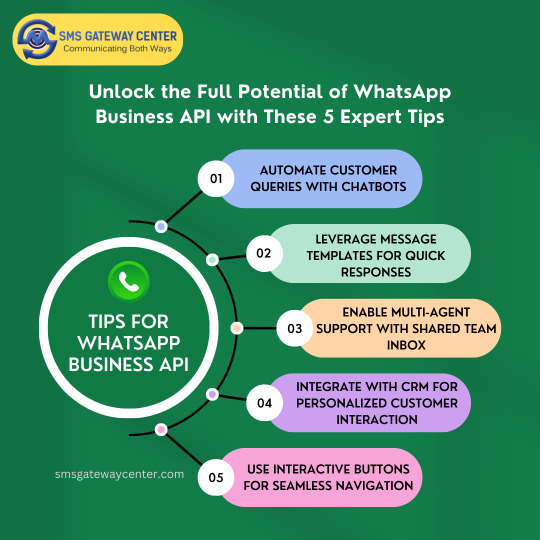
Unlock the Full Potential of WhatsApp Business API with These 5 Expert Tips
One powerful tool that has gained significant traction is the WhatsApp Business API. Designed to help businesses connect with customers efficiently, the API offers a plethora of features that can transform customer service and communication strategies.
#SMS Gateway Center#WhatsApp Business API#customer service automation#chatbots for business#message templates#shared team inbox#CRM integration#personalized customer communication#interactive buttons#customer engagement strategies#digital customer service#business communication tools#improve customer satisfaction#enhance customer experience#efficient customer support#streamline business operations
0 notes